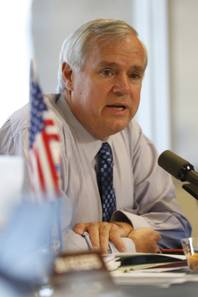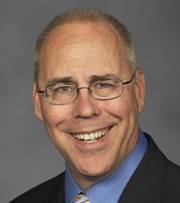Thursday, Dec. 31, 2009 | 2 a.m.
Sun Archives
Sun Coverage

Chancellor Dan Klaich

Neal Smatresk

Bill Raggio
As the year draws to a close, K-12 and higher education officials are looking ahead to see how they might guard against the deep cuts, layoffs and fiscal uncertainty that defined 2009 for Nevada’s public schools.
“This is exactly the time to look at the basic ... policies and theories of how we do things,” university system Chancellor Dan Klaich said. “That doesn’t mean we’re going to have all the money to make those changes immediately, but at some point we are going to come out of this recession and when we do, it’s up to us to make sure we’re coming out smarter and stronger.”
Both K-12 and higher education officials have key proposals they think could have spared them the worst effects of the state budget crisis had they been in place. For higher ed, it’s allowing universities to keep a greater share of nonresident tuition. For K-12, it’s the creation of a rainy-day fund.
Currently Nevada universities receive the same amount from the state for all students, even though out-of-state students pay significantly higher tuition. For a student taking 12 academic credits at UNLV, in-state undergraduate tuition is $2,165 per semester, compared with $8,335 for nonresidents.
UNLV President Neal Smatresk said this funding arrangement eliminates any incentive for Nevada universities to raise money by increasing their nonresident head counts.
Had UNLV been allowed to keep the nonresident revenue, it would have meant an extra $18 million in 2009. Funding cuts at the university, which was ordered to trim $32.8 million from its annual budget, would have been about half as severe.
“I call it ‘self help,’ ” Smatresk said. “Let us help ourselves.”
Smatresk’s proposal has the support of UNR President Milton Glick, according to his spokeswoman.
Although Klaich said the state might boost revenue with nonresident students, there also needs to be balance in enrollment.
The state’s universities were built to serve Nevadans, whose costs are subsidized by the state. Too many out-of-state students might lead to resentment on the part of taxpayers, Klaich said.
Assemblywoman Bonnie Parnell, D-Carson City, past chairwoman of the Legislative Committee on Education, said allowing universities to keep the additional out-of-state tuition might also spur other needed changes. It could be a carrot to encourage the state’s higher ed campuses to do a better job recruiting — and retaining — those students, Parnell said.
“Getting them here is only half the battle,” Parnell said. “We need to do a better job keeping them here — not only for the well-being and benefit of the students, but for the stability of the higher ed system. They go hand in hand.”
Senate Minority Leader Bill Raggio, R-Reno, said he understands why redirecting nonresident tuition revenue to UNLV sounds like an good way to boost the campus’ self-sufficiency. But it would have a significant effect on the state’s general fund, which currently retains those dollars.
The state general fund is in “dire straits,” Raggio said.
K-12 leaders see a sounder financial future in changing how the state funds school districts.
Under the current system, once the state’s minimum per-pupil guarantee is met, the leftover revenue reverts to the state’s general fund, even if the money was originally earmarked for education.
Assembly Bill 458, which was narrowly defeated in the final hours of the 2009 Legislature, would have redirected the overage to a separate “education stabilization fund” to help protect public schools from budget cuts in future economic downturns.
Over the past two years, about $157 million in education tax revenue collected statewide reverted to the general fund.
Hundreds of millions of dollars in K-12 funding has been cut during the budget crisis, including more than $250 million in Clark County.
“Smart planning means looking ahead a number of years, not just surviving the one year that you’re in,” said Jeff Weiler, chief financial officer of the Clark County School District. “We can’t even take for granted what we have in our budget right now.
“The worst position to be in is this year-to-year uncertainty,” he said. “Will it be raises or layoffs? It’s a horrible position for all of us.”
A rainy-day fund for education makes sense, but it’s not a short-term solution to the state’s budget crisis, said Assemblyman Mo Denis, D-Las Vegas. It would take years before the fund had enough money to provide a real safety net.
Meanwhile, education continues to consume the majority of the state’s budget, and when cuts need to be made, that’s where lawmakers are going to look, said Denis, past president of the Nevada PTA.
Nevada has a habit of “funding great education programs in good times, only to cut them in the bad times,” Denis said. “This is one of those big-picture questions we’re going to have to face during the next session.”

Join the Discussion:
Check this out for a full explanation of our conversion to the LiveFyre commenting system and instructions on how to sign up for an account.
Full comments policy